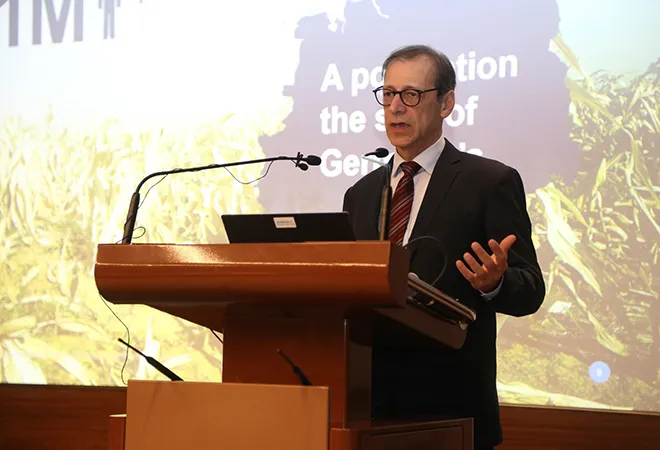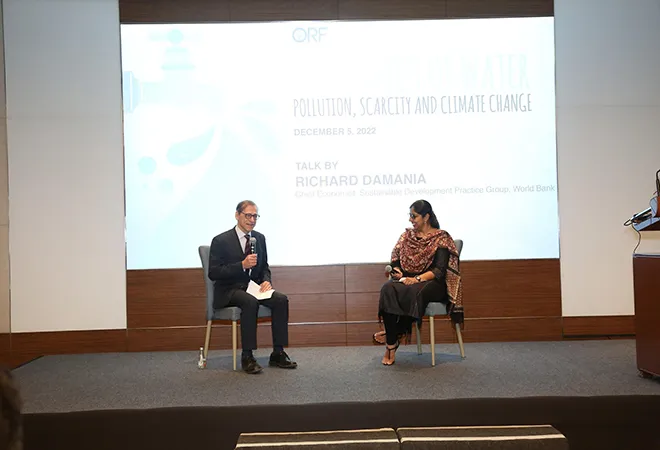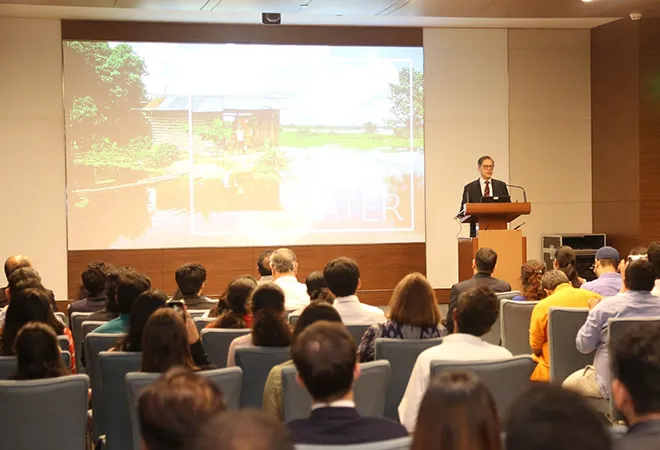On 5 December 2022, the Observer Research Foundation, Mumbai hosted Richard Damania, Chief Economist at the Sustainable Development Practice Group, World Bank, for a talk on the economic impacts of water on various sectors. Damania started by emphasising the importance of water as an essential resource that is vital to all aspects of life but one that is difficult to quantify in terms of total economic value. Quantifying the total economic value of water is challenging as it is difficult to measure its indirect benefits.
Damania discussed the global problem of water stress, which will only increase due to population growth and climate change, particularly in poorer countries with high fertility rates that are often in conflict with each other.
He also discussed the impact of water availability on agriculture. Farms are on the front lines of climate change, and droughts and dry shocks can significantly reduce productivity and yields. In contrast, wet shocks, such as floods, can increase yields. He highlighted the importance of water in urban areas as cities contribute to 80 percent of global GDP and water availability is essential for manufacturing. He explained the economic costs of water scarcity in cities, including building and maintaining infrastructure to provide clean water.
Damania discussed three main types of water issues that affect different parts of the world: Too much water, too little water, and dirty water. He explained that the expansion of irrigation had led farmers in dry areas to switch to water-intensive crops like rice, sugarcane, and cotton. Still, these crops are particularly vulnerable to drought. This shift has been observed in Maharashtra's drought-prone regions, where water-intensive crops have replaced traditional agriculture. He further stated that unsustainable water cycles had impacted water availability for families, especially in rural areas. Further elaborating on the plight of water availability in cities, he said that water is a multifaceted economic asset, and each economic aspect entails a distinct policy response.

Damania explained how a wide range of factors, including chemicals in water, sanitation issues, and other pollutants have made water conservation and management a global challenge. The Chief Economist also discussed the economic impacts of water on households, particularly in rural areas. Changes in water availability can affect household income, food security, and overall quality of life. He explained how urban areas face unreliable infrastructure, impacting production, sales, and revenue. Water stress affects families through uncertainties in their incomes, jobs, and long-term health and welfare.
Answering a question on the correlation between gender and water, he stated that water scarcity has a cascading effect on gender. He noted that early life rainfall scarcity and its variations correlate to female empowerment, a woman's agency to exercise power in their households, and fertility rates. He also highlighted the challenges of quantifying the overall economic impact of water, as it depends on variables such as the growth rate of the country, rainfall level, and water quality.

Speaking of India’s G20 Presidency, Damania emphasised how India has the opportunity to lead the way for going beyond global dialogue and putting the entire water cycle at the centre of the G20 focus on sustainability. Summing up, Damania stated that India’s G20 presidency offers the country a golden opportunity to shape and navigate global action on water justice and serve as a gateway for building lasting sustainable water management practices for the economic development of nations and for the greater pursuit of SDGs.
The key message was that water has multiple economic attributes and requires distinct policy responses for its effective and sustainable management. If water is not managed more prudently—from source to tap and back to the source—the crises being observed today will be tomorrow’s catastrophes.
This report has been compiled by Prithvi Gupta and Anusha Kesarkar-Gavankar.
The views expressed above belong to the author(s). ORF research and analyses now available on Telegram! Click here to access our curated content — blogs, longforms and interviews.

 Damania explained how a wide range of factors, including chemicals in water, sanitation issues, and other pollutants have made water conservation and management a global challenge. The Chief Economist also discussed the economic impacts of water on households, particularly in rural areas. Changes in water availability can affect household income, food security, and overall quality of life. He explained how urban areas face unreliable infrastructure, impacting production, sales, and revenue. Water stress affects families through uncertainties in their incomes, jobs, and long-term health and welfare.
Answering a question on the correlation between gender and water, he stated that water scarcity has a cascading effect on gender. He noted that early life rainfall scarcity and its variations correlate to female empowerment, a woman's agency to exercise power in their households, and fertility rates. He also highlighted the challenges of quantifying the overall economic impact of water, as it depends on variables such as the growth rate of the country, rainfall level, and water quality.
Damania explained how a wide range of factors, including chemicals in water, sanitation issues, and other pollutants have made water conservation and management a global challenge. The Chief Economist also discussed the economic impacts of water on households, particularly in rural areas. Changes in water availability can affect household income, food security, and overall quality of life. He explained how urban areas face unreliable infrastructure, impacting production, sales, and revenue. Water stress affects families through uncertainties in their incomes, jobs, and long-term health and welfare.
Answering a question on the correlation between gender and water, he stated that water scarcity has a cascading effect on gender. He noted that early life rainfall scarcity and its variations correlate to female empowerment, a woman's agency to exercise power in their households, and fertility rates. He also highlighted the challenges of quantifying the overall economic impact of water, as it depends on variables such as the growth rate of the country, rainfall level, and water quality.
 Speaking of India’s G20 Presidency, Damania emphasised how India has the opportunity to lead the way for going beyond global dialogue and putting the entire water cycle at the centre of the G20 focus on sustainability. Summing up, Damania stated that India’s G20 presidency offers the country a golden opportunity to shape and navigate global action on water justice and serve as a gateway for building lasting sustainable water management practices for the economic development of nations and for the greater pursuit of SDGs.
The key message was that water has multiple economic attributes and requires distinct policy responses for its effective and sustainable management. If water is not managed more prudently—from source to tap and back to the source—the crises being observed today will be tomorrow’s catastrophes.
Speaking of India’s G20 Presidency, Damania emphasised how India has the opportunity to lead the way for going beyond global dialogue and putting the entire water cycle at the centre of the G20 focus on sustainability. Summing up, Damania stated that India’s G20 presidency offers the country a golden opportunity to shape and navigate global action on water justice and serve as a gateway for building lasting sustainable water management practices for the economic development of nations and for the greater pursuit of SDGs.
The key message was that water has multiple economic attributes and requires distinct policy responses for its effective and sustainable management. If water is not managed more prudently—from source to tap and back to the source—the crises being observed today will be tomorrow’s catastrophes.